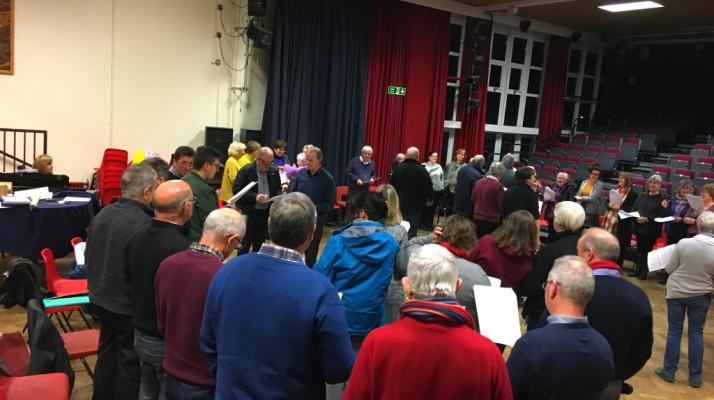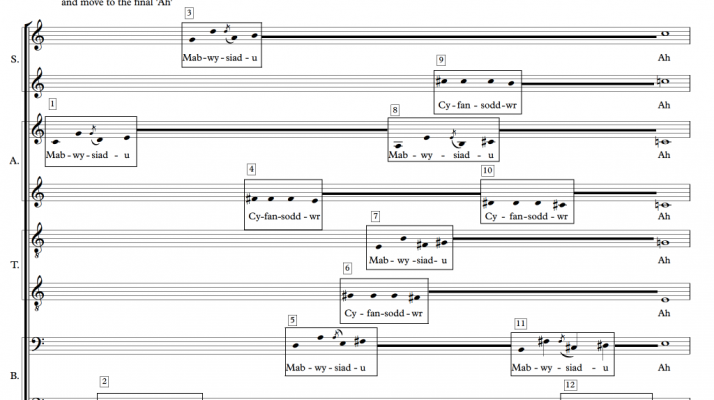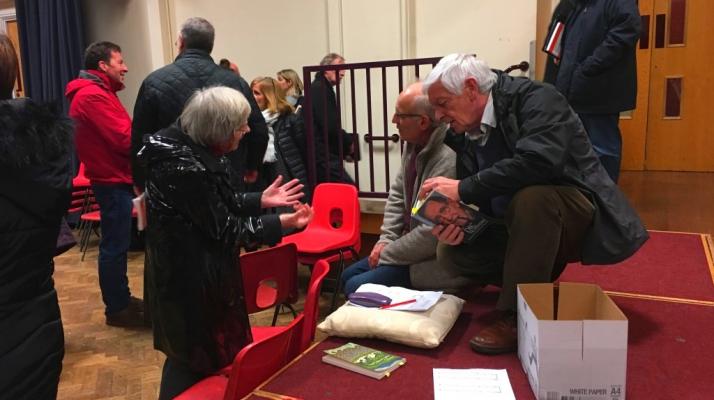Catching one's breath: reflecting on the first workshop
Composer Max Charles Davies finds a minute to look back to 16 January, his inaugral Adopt a Composer session with Côr Crymych a'r Cylch.
These last months have seemed to go by in a frenzied blur, but I’m very grateful for this opportunity to reflect on the first workshop.
After a couple of meetings at work, I drove the short distance from UWE Bristol to Bristol Parkway train station where I met Colin Riley, our mentor, and then it was on to Crymych! I mention this detail because that time in the car was absolutely invaluable. I was able to mine Colin’s extensive Adopt a Composer experiences and banked a lot of wisdom during my mental preparations for the first workshop and for the project as a whole.
I had prepared seven short exercises for the choir to sing through. Each one tried out a different approach to some material that I had derived from translating the choir’s name into pitches.
These approaches comprised of various forms of canon, some more traditional choral writing, and then finally some aleatoric music. The process of writing these exercises was collaborative: I sent them at various stages to Angharad, the choir’s brilliant musical director, and she was able to suggest additions where necessary, such as to add the solfege names of notes which the choir finds helpful.
Far from being a conventional rehearsal, we began in a circle and Colin and I participated in the rhythmic warm up exercises – which were great fun! Colin then explained to the choir a little about the Adopt a Composer scheme, which was well received, and then the workshop began.
The first three exercises I’d written were for mixed groups, so Angharad split us up and spaced us around the rehearsal hall before launching into the material with gusto!

I suppose, being totally honest, I was slightly apprehensive, as I was worried that some of the things I’d written wouldn’t be particularly well-received. But, those worries were quickly assuaged as the choir took to the short pieces with enthusiasm and ease!
After trying out the various canons, there was an opportunity to reflect and suggest some new ideas. Angharad and I quickly established an open and easy working relationship.

While the choir sang through the aleatoric exercise I had prepared, Colin and I stepped out briefly to talk to the head teachers in the choir about involving school children in the project somehow, and then after that, to the poets in the choir about the all-important texts that would eventually comprise the libretto of this work.
I mentioned in my previous blog post that the piece would explore community, unity, identity, togetherness and similar themes across a seven movement structure. I was able to develop these ideas further with the writers, and from these discussions came up with a working brief on which kinds of texts to source.
Another useful thing that came up was the need for me to be sensitive to the metre of Welsh poetry, and a mistake in one of the short exercises I’d written was pointed out to me. It became, and remains, a priority for me to respect the Welsh language when setting it to music. I’ll discuss this more I’m sure!
I returned to the hall to hear the choir sing through the last exercise I had written:

I was impressed! I knew that something like this could definitely be successfully incorporated into the piece if it was appropriate.
As the rehearsal drew to a close, I was able to offer my sincere thanks to the choir for dedicating a whole two hours to material that I had prepared, and for singing it so brilliantly! I left knowing the way forward: to organise visits to local schools to record the spoken and sung thoughts of children about their locality, and to cement a brief for the poets into a single document. From both of these, the texts for the piece would gradually be compiled.
As I was leaving, I noticed that the poets had reconvened, to continue their discussions!


